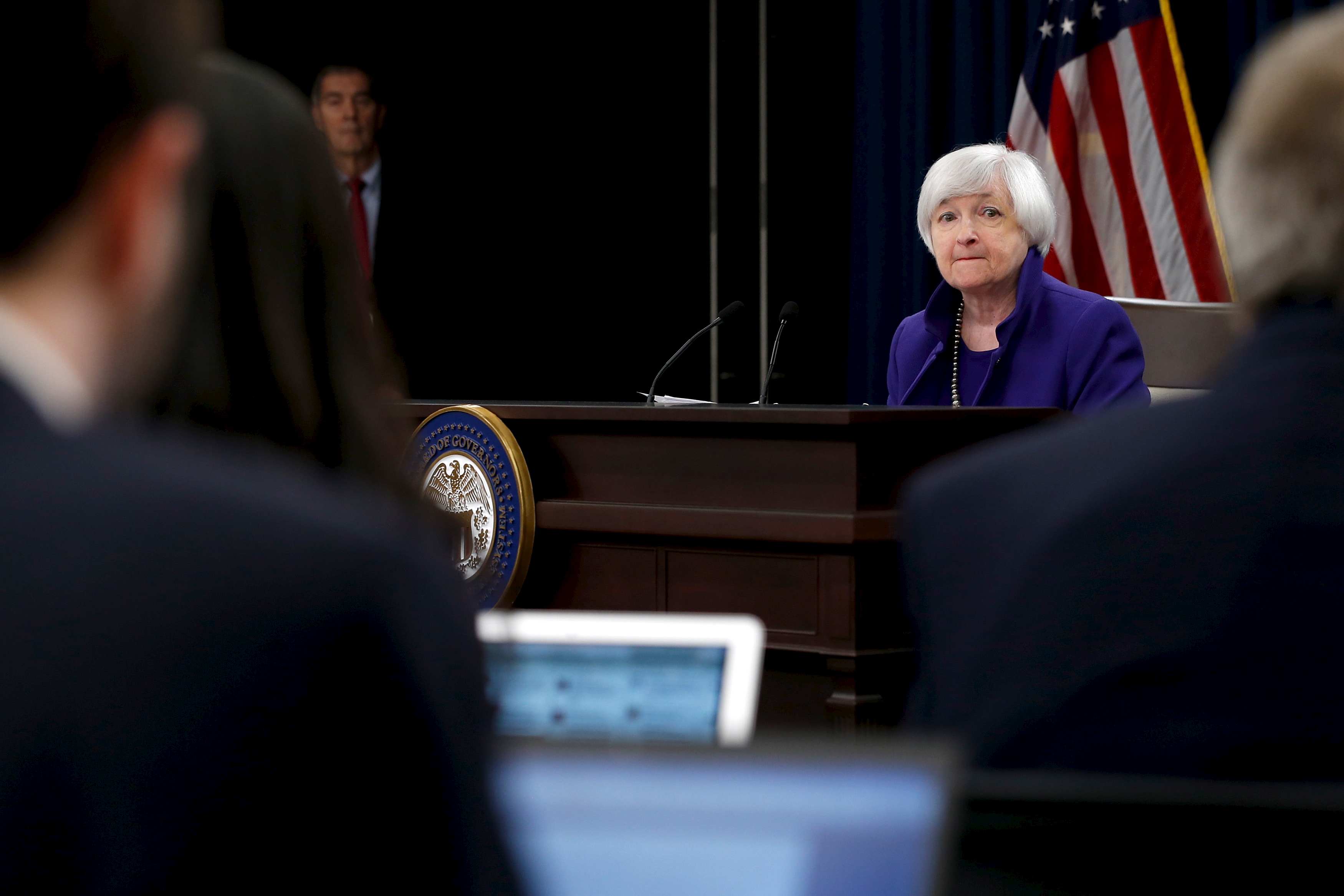Republicans and the Fed are blowing up the deficit — and no one cares
Where did all the deficit scolds go?


One of the more infuriating falsehoods about the Republican Party is how they are earnestly concerned with cutting the deficit. For years now they have been howling that no new money could possibly be spent on infrastructure or social programs because "we're broke." But when it comes time to make real decisions, their true priorities are revealed.
Two recent developments illustrate this point: modifications to ObamaCare, and the recent rate hike at the Federal Reserve. The former has changed the program so that it will no longer reduce the deficit, while the latter will have an enormous effect on the government's deficit trajectory. Deficit scolds are ignoring them both.
Let's take them in turn. Republicans have been whining for years that ObamaCare increases the deficit, ignoring massive evidence to the contrary. Now it's probably going to be true — ironically, because Republicans will vote to take a bunch of revenue measures out of the law. This is part of the omnibus spending bill, which delays the medical device tax and "Cadillac tax" (on expensive health care plans) for two years. Together, the taxes would bring in something like $110 billion over the next 10 years. But if the taxes aren't going to be implemented now, they probably are never going to be.
The Week
Escape your echo chamber. Get the facts behind the news, plus analysis from multiple perspectives.

Sign up for The Week's Free Newsletters
From our morning news briefing to a weekly Good News Newsletter, get the best of The Week delivered directly to your inbox.
From our morning news briefing to a weekly Good News Newsletter, get the best of The Week delivered directly to your inbox.
To be clear, many Democrats also supported these rollbacks, because they generally accept Republican logic on raising taxes and are deeply intertwined with the health care industry and unions (which don't like the Cadillac tax). But President Obama supports the taxes, and Republicans control the House and Senate — this is on them.
At any rate, the point is that when there is a choice, the deficit is always Republicans' last priority. That's why all their presidential tax plans would roughly increase the national debt by between $1 and 15 trillion.
The point about central bank policy is more interesting. Deficit scolds typically envision the budget as made up of two things: revenue from taxes, and spending on social programs, government agencies, and the military. Interest payments are typically set aside as an irrelevant distraction, or the mere mechanism by which a debt crisis will take hold, after over-spending has gone on for too long. Hence the typical scold argument that we need to raise taxes and cut social programs (usually tilted heavily towards the latter).
But it turns out that interest payments and monetary policy are at the center of deficit spending. High interest rates mean issuing new debt is more expensive, and so is refinancing old debt that needs to be rolled over. This is mostly what caused the deficit explosion during President Reagan's term — not his combination of tax cuts and spending increases. Conversely, when the economy is weak, the government gains a nearly unlimited ability to finance itself through issuing debt. Indeed, for much of the last seven years, borrowing was literally cheaper than free, after adjusting for inflation. Under President Obama, the overall national debt has increased dramatically, but the cost of financing has been at historic lows.
A free daily email with the biggest news stories of the day – and the best features from TheWeek.com
This means that the behavior of America's central bank — the Federal Reserve — is probably the single most important factor in the future trajectory of U.S. borrowing expenses. And what do you know, yesterday the Fed raised interest rates for the first time since 2006. Markets expect a gradual pace of additional rate hikes throughout the year — thus, the Fed's decision will increase deficit spending, probably by quite a bit (the specific amount will depend on how fast the hikes come, and whether they can be sustained).
Are any Republicans exploring this issue? Nope! None of the right-wing or centrist deficit scolds have even mentioned it, as far as I can tell. Indeed, many of them have been calling for tighter monetary policy and/or the gold standard since the beginning of the Obama era, but they seem either unable or unwilling to grasp the implications.
Setting aside whether an interest hike is actually a good idea (I'd bet a lot of money it will be seen as a disastrous mistake inside of a year or two), the take-home message here is that the politics of deficit paranoia is a fraud, totally disconnected from policy reality. It's a convenient cudgel to bash programs which are disliked for other reasons, nothing more.
Ryan Cooper is a national correspondent at TheWeek.com. His work has appeared in the Washington Monthly, The New Republic, and the Washington Post.
-
 Why is Tulsi Gabbard trying to relitigate the 2020 election now?
Why is Tulsi Gabbard trying to relitigate the 2020 election now?Today's Big Question Trump has never conceded his loss that year
-
 The best fanfic that got published and went mainstream
The best fanfic that got published and went mainstreamThe Week Recommends Fan fiction websites are a treasure trove of future darlings of publishing
-
 ‘Something close to a universal rallying cry’
‘Something close to a universal rallying cry’Instant Opinion Opinion, comment and editorials of the day
-
 The billionaires’ wealth tax: a catastrophe for California?
The billionaires’ wealth tax: a catastrophe for California?Talking Point Peter Thiel and Larry Page preparing to change state residency
-
 Bari Weiss’ ‘60 Minutes’ scandal is about more than one report
Bari Weiss’ ‘60 Minutes’ scandal is about more than one reportIN THE SPOTLIGHT By blocking an approved segment on a controversial prison holding US deportees in El Salvador, the editor-in-chief of CBS News has become the main story
-
 Has Zohran Mamdani shown the Democrats how to win again?
Has Zohran Mamdani shown the Democrats how to win again?Today’s Big Question New York City mayoral election touted as victory for left-wing populists but moderate centrist wins elsewhere present more complex path for Democratic Party
-
 Millions turn out for anti-Trump ‘No Kings’ rallies
Millions turn out for anti-Trump ‘No Kings’ ralliesSpeed Read An estimated 7 million people participated, 2 million more than at the first ‘No Kings’ protest in June
-
 Ghislaine Maxwell: angling for a Trump pardon
Ghislaine Maxwell: angling for a Trump pardonTalking Point Convicted sex trafficker's testimony could shed new light on president's links to Jeffrey Epstein
-
 The last words and final moments of 40 presidents
The last words and final moments of 40 presidentsThe Explainer Some are eloquent quotes worthy of the holders of the highest office in the nation, and others... aren't
-
 The JFK files: the truth at last?
The JFK files: the truth at last?In The Spotlight More than 64,000 previously classified documents relating the 1963 assassination of John F. Kennedy have been released by the Trump administration
-
 'Seriously, not literally': how should the world take Donald Trump?
'Seriously, not literally': how should the world take Donald Trump?Today's big question White House rhetoric and reality look likely to become increasingly blurred
